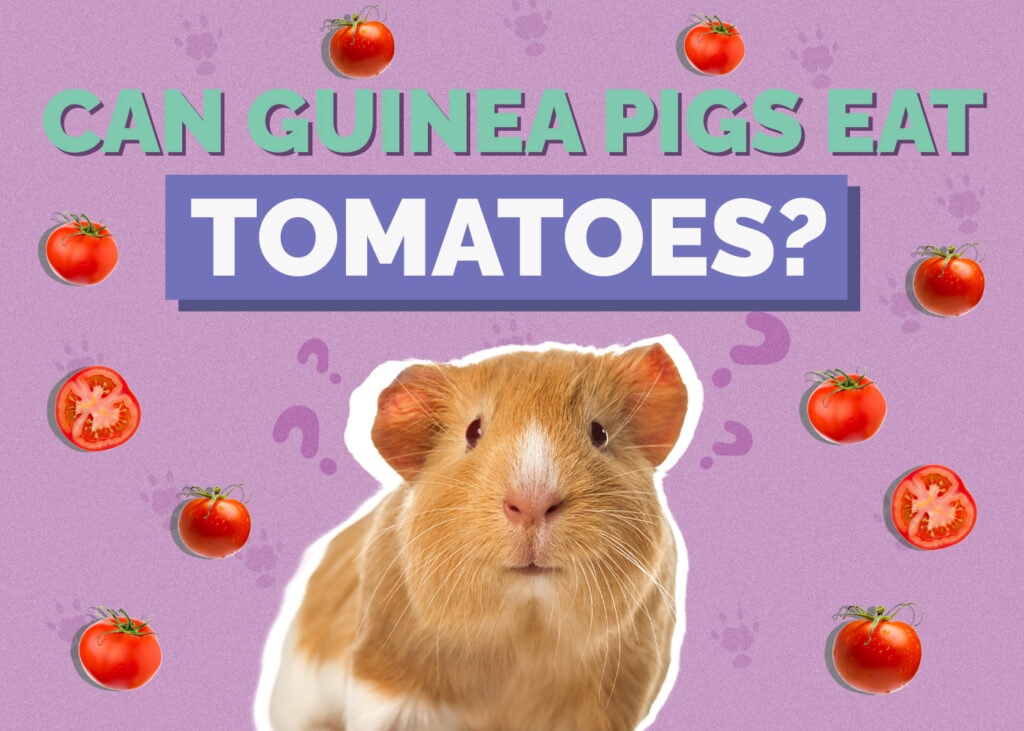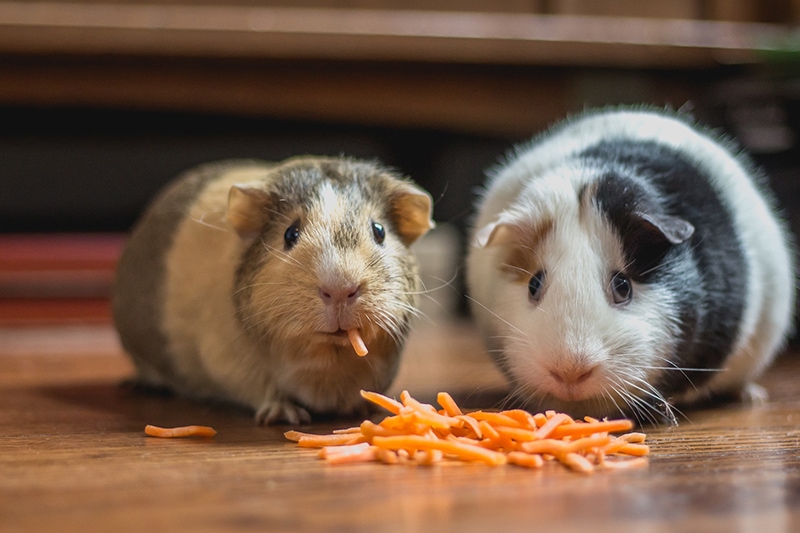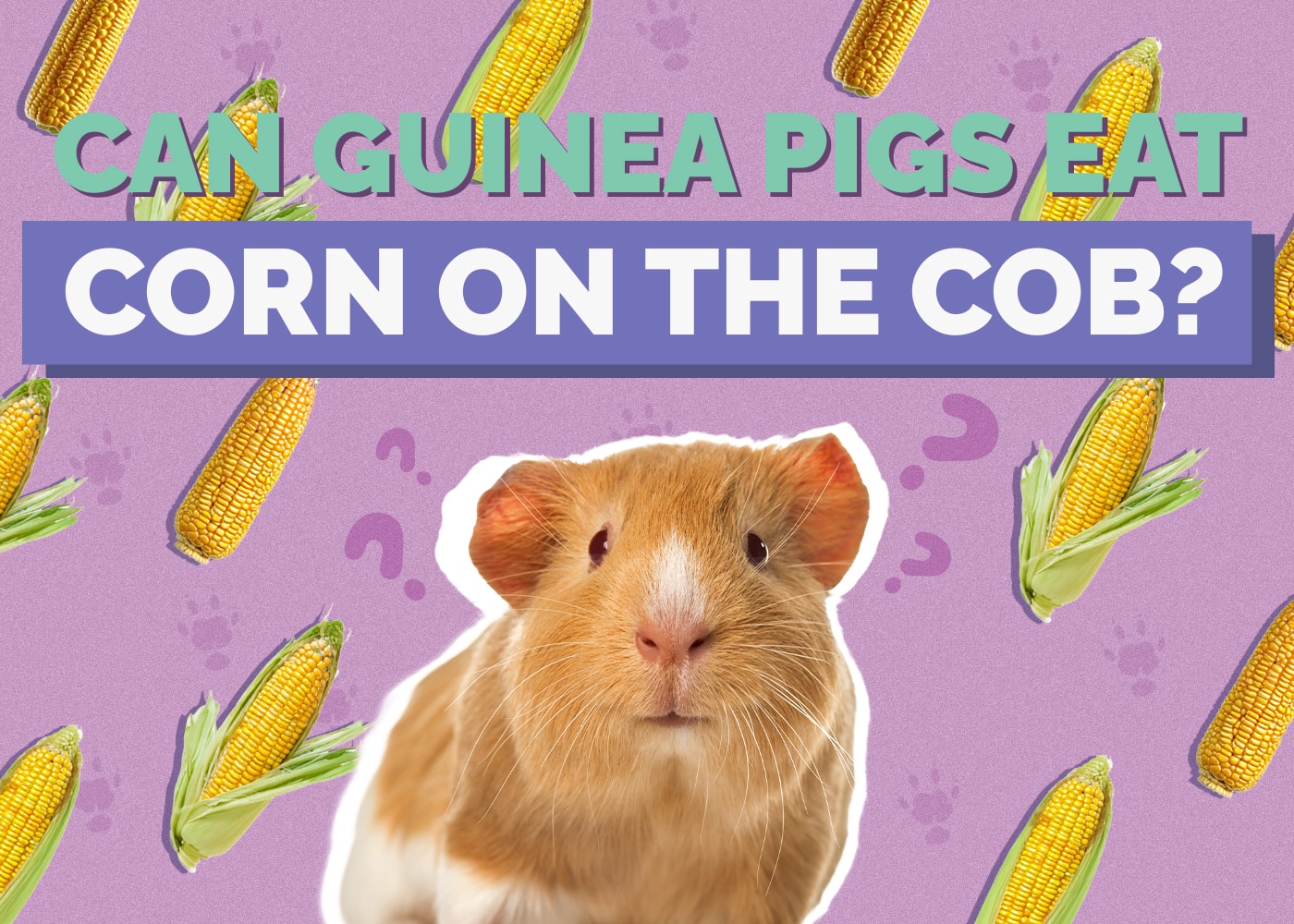Can Guinea Pigs Eat Tomatoes? Vet-Reviewed Facts & FAQ
Updated on

Guinea Pigs are among the most popular small rodent pets and are very entertaining to care for. To keep your Guinea Pig healthy, it’s important to feed a balanced diet while avoiding dangerous and unhealthy food items. Not only can Guinea Pigs eat tomatoes, but they also provide a vital nutrient for your pet’s diet.
Keep reading to learn the role tomatoes can play in keeping your Guinea Pig healthy and how often to serve them. We’ll also cover the basics of a healthy Guinea Pig diet and list some foods your Guinea Pig should never eat.

Why Tomatoes Are Good for Your Guinea Pig
Unlike many other animals, Guinea Pigs can’t produce Vitamin C and must obtain this essential nutrient from their diet or supplementation. Without enough Vitamin C, Guinea Pigs may experience weight loss, lethargy, diarrhea and develop scurvy. Feeding fruits and vegetables high in Vitamin C is one way to ensure your Guinea Pig stays healthy.
Red, orange, and yellow fruits or vegetables typically contain the highest amounts of Vitamin C. We’re familiar with oranges and orange juice as a source of Vitamin C, but tomatoes also contain it. Talk to your vet about how much Vitamin C your Guinea Pig needs each day. Your pet may need to take a Vitamin C supplement in addition to eating foods like tomatoes if they have any health problems.

How to Feed Tomatoes to Your Guinea Pig
Guinea Pigs should eat about ½–1 cup of vegetables daily as part of a balanced diet. Ideally, serve two or three different vegetables each time.
- Green Beans
- Parsley (in moderation)
- Carrots
- Dandelion greens
Introduce tomatoes (and any other new food) into your Guinea Pig’s diet slowly to avoid stomach upset and diarrhea. Don’t feed the leaves or stems of the tomato to your Guinea Pig, and remove uneaten vegetables each day to prevent spoiling.
Tomatoes should not be given every day as they are quite acidic. This can potentially contribute to inflammation at the corners of the mouth called cheilitis. To avoid this limit acidic fruits such as tomatoes and apples. The causes of cheilitis are not fully understood and are multifactorial but acid and abrasive foods are thought to play a part.

What Else Should a Guinea Pig Eat?
Much of a healthy Guinea Pig diet (about 85%) should be made up of grass hay, such as Timothy. Guinea pigs should have constant access to hay, which keeps their teeth and digestion healthy. After hay, vegetables should comprise the largest part of your Guinea Pig’s diet about a handful a day.
Guinea pigs can also eat a small amount of pellet food each day, around 1 egg cup full. Avoid formulas with seeds, nuts, and dried fruit or those not explicitly made for Guinea Pigs. Extruded guinea pig pellets are recommended.
Because it’s high in sugar, fruit is considered a treat for Guinea Pigs and should only be offered occasionally. Try to feed fruit and other treats no more than once a week.
- Apples
- Cantaloupe
- Berries
Guinea pigs should have constant access to fresh water and Vitamin C supplements if recommended by your veterinarian. They’ll also need safe chew objects to keep their teeth from growing out of control.

What Foods to Limit for Guinea Pigs?
Certain types of vegetables should be avoided or offered occasionally because they may cause gas or contribute to the development of bladder stones. These include:
- Broccoli
- Kale
- Chard
- Cabbage
- Spinach
- Brussels sprouts
- High-starch foods (bread, corn, peas)
- Pellets made for other small animals
- Spoiled or unwashed food

Conclusion
Tomatoes are safe and healthy for your Guinea Pig to eat as part of a balanced diet. Although Guinea Pigs are good pets for pet owners, they can still become sick or overweight if they eat the wrong diet. With proper care, Guinea Pigs can live 5 years or more, so make sure you’re prepared for the commitment of pet ownership before you bring one of these cute rodents home.
See Also:
Featured Image Credit: JumpStory












